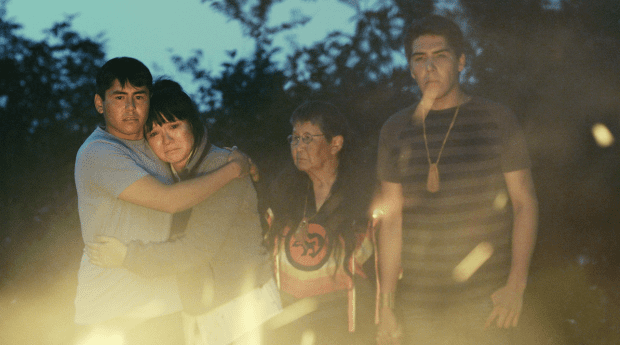As Shane’s personal problems worsen, so does the drip, drip, drip of dirty water from the leak in his roof. It’s because the aboriginal teenager’s attempts to patch the leak are as haphazard as his efforts to fix the bigger issues in his life.
He’s in over his head. His sister, Destiny, has just killed herself. He’s closeted and wants to leave the reserve, and move to the city to be himself and to continue his schooling, but money’s an issue. So are the expectations of people in the community — if he stays, he betrays his potential; if he goes, he’s a snob.
He’s only a teenager and doesn’t know what to do. His mother’s no help. She spends her days curled up in bed, immobilized by grief over his sister’s suicide, while he desperately casts about for solutions, digging a deeper and deeper hole for himself.
Cree/Métis filmmaker Adam Garnet Jones put a lot of himself into his film, Fire Song. “I think Shane’s emotional reality is all me,” he says. “I identify very closely with where he’s coming from, and experiences like wanting to come out, but being afraid, and also having very involved, real relationships with women and not wanting to hurt them.”
“But the circumstances of him being in an isolated northern community and his sister committing suicide — that’s not from my life. Those are fragments and bits and pieces of stories I’ve heard from other people.”
Jones put the film together for a lot of reasons, but the initial idea for it came from a memory he has of hearing his dad talking on the phone with a friend whose teenage son had just committed suicide. “I remember the fear that he was going to be the first of a cluster of suicides. That pairing of grief and fear — grief for those lost, but fear that it was the beginning of a terrible wave,” he says. “I wanted to write a story that took place in the middle of that.”
“The problem [of suicide in queer and aboriginal communities] is so huge that nobody really knows how to talk about it. So I felt like making this film and telling this story would be a great way to bring some of those conversations out in the open.”
It was important to Jones that the movie wasn’t just a cliché about a place that’s miserable and everyone hates and wants to get away from. So, Shane’s community is one of rusted-out cars, dilapidated houses and suicide, but it’s also one with a great deal of love and strength, where a day that begins with a screaming argument can end with a moving show of support.
“There are so many movies about people wanting to leave their shitty small towns and then at the end of the movie they do,” he says. “I think for aboriginal people, and probably most people who come from small, isolated communities, your relationship to home is actually a lot more complicated.”
Fire Song premiered at the 2015 Toronto International Film Festival. It will soon screen at the closing night gala of the ImagineNATIVE Film and Media Arts Festival. Every year, ImagineNATIVE showcases film, video and audio and digital media that reflects the diversity of indigenous nations.
Jones recognizes that when people see a film about Aboriginal people and communities, they bring their biases and preconceived ideas with them, and some viewers will see only hopelessness at the film’s conclusion. But he hopes people find a positive message amid the film’s muddy roads, screams and gunshots.
“I hope people come away with a strong feeling of admiration for the characters. They do deal with so much, but in the end they’re able to come together and stand strong together and that’s so much the story of Aboriginal communities across the country.”
(Updated to include video, May 16, 2016.)
Updated May 16, 2016:
Fire Song
Friday, May 13–Thursday, May 19, 2016
Carlton Cinema, 20 Carlton St, Toronto
Closing Night Gala: Fire Song
Sunday, Oct 18, 2015, 6pm
TIFF Bell Lightbox, 350 King St W, Toronto
imaginenative.org


 Why you can trust Xtra
Why you can trust Xtra


